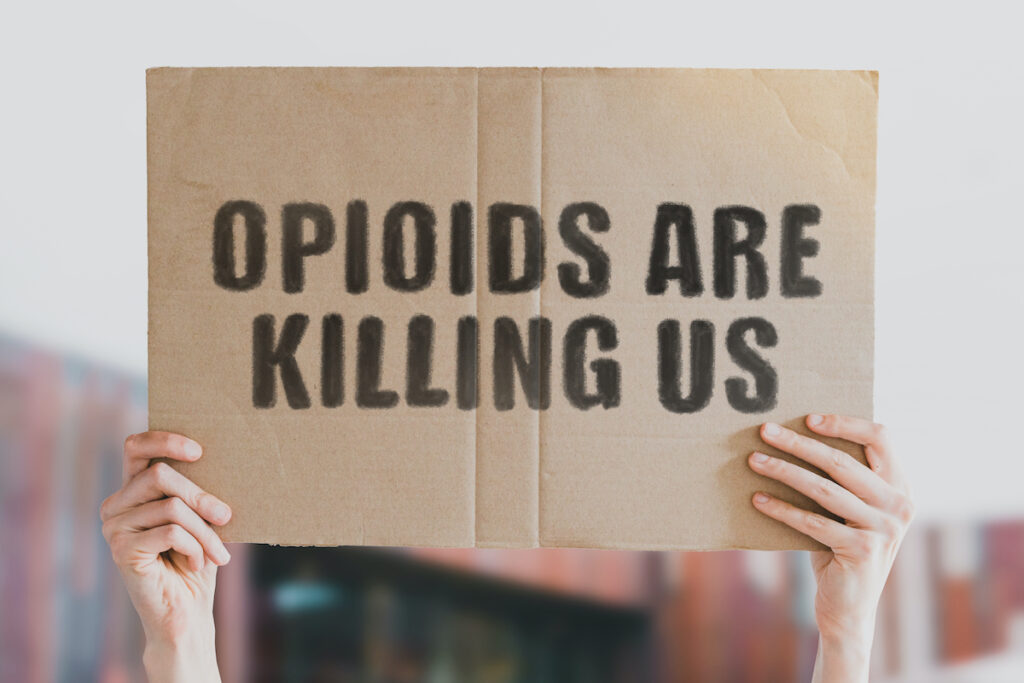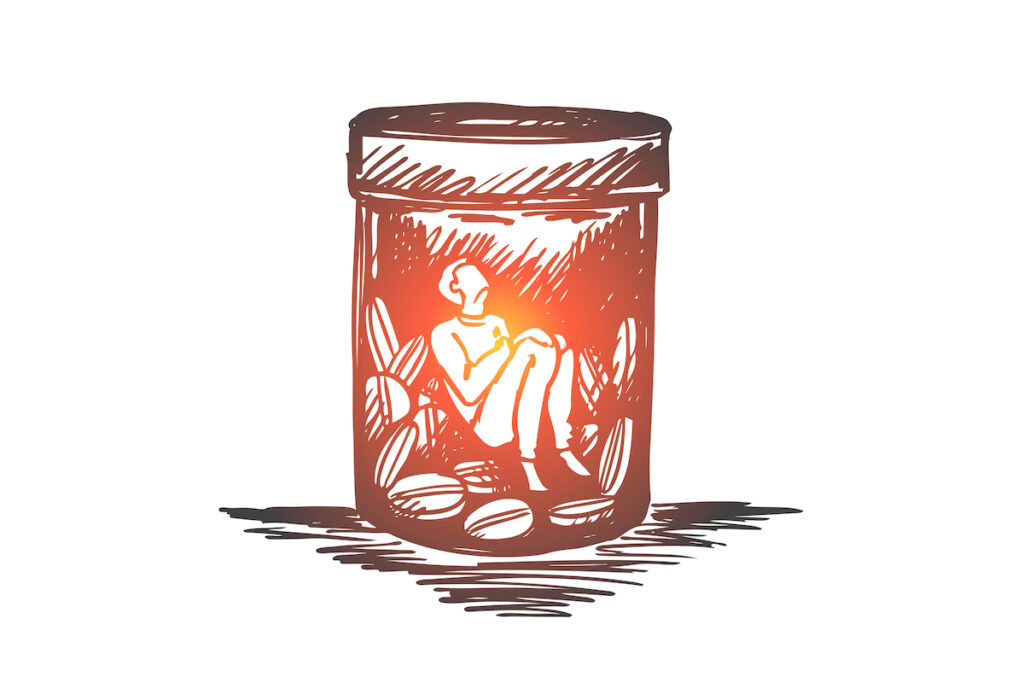
America is being ravaged by problems with opiates; both prescribed medication and illicit forms, such as heroin and fentanyl. Hundreds of thousands of Americans have died as a result of using these drugs. Many of these people were prescribed opiates like oxycodone following surgery or for more general pain. The rapid rise in prescribing these opiates was not accidental, the main company found to be responsible for promoting the use of these drugs, Purdue Pharma, has accepted the role it played in contributing to this crisis.
The Covid-19 pandemic has amplified these problems with a staggering 30% rise in overdoses in America during 2020 compared to 2019. In the UK we have our own problems with opiates like heroin, while Scotland, like England and Wales, has recorded yet another record rise in drug-related deaths.
Thus, this new systematic review and meta-analysis by Santo and colleagues (2021) exploring the role of opiate agonist treatment in reducing opiate fatalities is timely and welcome. The authors’ aim was to review the evidence supporting providing substitute drugs for opiates and whether this has an impact on drug-related fatalities.

The Covid-19 pandemic has amplified problematic use of opiates with a staggering 30% rise in overdoses in the US 2020.
Methods
During January and February last year the authors used three databases to search for papers. All types of studies were included, such as observational and randomised controlled trials, which were then reviewed by two independent reviewers to ensure they met the inclusion criteria. They specified that at least one treatment episode involving a substitute drug like methadone or buprenorphine should be recorded.
As with so many areas of research, there were no standard and universal definitions of cause of death, so the authors of studies were contacted by the reviewers to establish the definitions and data used in reporting fatalities.
Results
The review team found 7,980 papers in total which they whittled down to 72 papers by applying their inclusion and exclusion criteria. They included 15 randomised controlled trials that had a total of 3,852 participants and 36 cohort studies that had a total of 749,634 participants.
These studies revealed that the rate of mortality for those in treatment was 11 per 1,000 compared to a ratio of 23.97 for those not in treatment. This equates to a 50% lower risk of mortality for those who are in treatment. Given the thousands of people that die annually due to drugs, this would make a significant impact on drug-related fatalities, reversing the annual rise in deaths over the last decade.
Therefore, could we say with confidence that being in specialist drug treatment for opiates saves lives?

The findings of this systematic review suggest a 50% lower risk of mortality for people who are in substitute treatments for opiates, compared to those who are not receiving similar treatment.
Conclusions
The authors concluded:
This systematic review and meta-analysis found that Opioid Agonist Treatment (OAT) was associated with lower rates of mortality. However, access to OAT remains limited, and insurance coverage remains low. Work to improve access globally may have important population-level benefits.

“This systematic review and meta-analysis found that Opioid Agonist Treatment (OAT) was associated with lower rates of mortality. However, access to OAT remains limited, and insurance coverage remains low. Work to improve access globally may have important population-level benefits.”
Strengths and limitations
While we’re waiting for the perfect piece of research to be done it’s worth highlighting some limitations in this review which the authors also acknowledge. Alarmingly, many studies didn’t specify why treatment ended, had treatment been completed, or had the person dropped out (?) which seems like a basic and important detail that shouldn’t have been so ambiguous. Understanding why an individual does or doesn’t complete treatment provides useful information on the relative success of that intervention.
The authors of the review suggest that the evidence base could be improved if researchers included more detailed clinical information, such as the severity of opiate dependence, linked to cause of death. Likewise, they suggest using linked data that follow individuals through critical points in their journey, such as prison, would provide clearer results rather than observational associations.

The authors of this study suggest that the evidence base could be improved if researchers included more detailed clinical information, such as the severity of opiate dependence, linked to cause of death.
Implications for practice
The findings of this review add to existing evidence suggesting that treatment is a protective factor for drug-related mortality. It’s important to distinguish the way treatment is provided in America and the UK. Unlike the UK, America has Medicare and Medicaid, the former is an insurance-based treatment, while the latter is provided irrespective of ability to pay. In principle, these two treatment methods sound comprehensive, but the reality is that many people with opiate dependency are unable to get treatment in a timely way. Not that the UK is perfect either, despite being based on the NHS principle of free care at the point of need, years of budget cuts to specialist treatment have compromised what is offered and who it’s offered to. A recent government sponsored review carried out by Dame Carol Black essentially found that the current treatment system was unfit for purpose.
Some health problems are difficult to solve as we don’t have sufficient evidence on how to intervene, but we have an evidence base for drug-related deaths and know how to reduce them. There’s the headline grabbing drug consumption rooms where people can safely go to take their drugs, which does reduce the risk of fatal overdose. But there are less eye-catching interventions that yield just as impressive results. The most important of these is ensuring adequate doses of substitute drugs like methadone and buprenorphine. Sub-optimal dosing means individuals feel uncomfortable and are more likely to top up substitute prescriptions with street heroin or black-market methadone. Both ensure people remain involved in drug dealing and petty crime or commercial sex to fund their drug use.
We’ve seen how political orthodoxy has rapidly changed during the Covid pandemic. Another similar political epiphany is needed to reduce drug-related deaths. Instead of viewing problem drug use through a lens of crime and punishment, we need our government to view it as a health and compassionate issue. It won’t be popular with voters, as taxpayers’ money is used to invest in specialist drug treatment, but it will save lives. The government has a clear choice: ignore the record numbers dying prematurely or provide the support that values people and their families.

Instead of viewing problem drug use through a lens of crime and punishment, we need our government to view it as a health and compassionate issue.
Statement of interest
None.
Links
Primary paper
Santo, T., Clark, B., Hickman, M., Grebely, J., Campbell, G., Sordo, L., Chen, A., Tran, L.T., Bharat, C., Padmanathan, P. and Cousins, G., 2021. Association of opioid agonist treatment with all-cause mortality and specific causes of death among people with opioid dependence: a systematic review and meta-analysis. JAMA Psychiatry.
Other references
Black, C. 2021. Review of drugs-phase two report. Department of Health and Social Care – https://www.gov.uk/government/publications/review-of-drugs-phase-two-report
Hamilton, I. Who do we help after an opiate overdose? Mental Elf, 20th of October 2020. https://www.nationalelfservice.net/mental-health/substance-misuse/opiate-overdose/
Photo credits
- Photo by Tim Cooper on Unsplash
